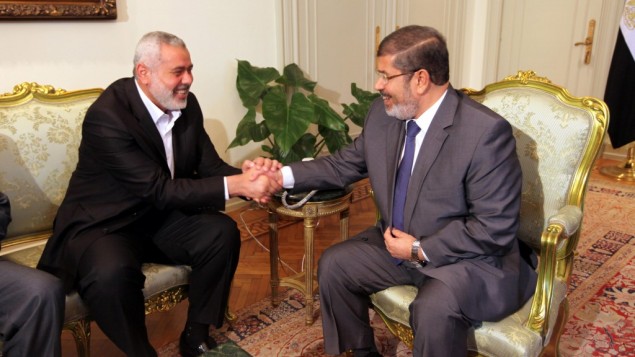http://www.timesofisrael.com/officially-silent-israel-privately-upbeat-over-morsis-ouster/

While Israeli leaders have refrained from commenting on the ousting of Egypt’s president Mohammed Morsi by the army, political and military sources privately indicated Thursday that they considered the turn of events potentially beneficial to Israel, if also largely unpredictable.
Asked directly about the unrest in Israel’s southern neighboring state earlier this week, Prime Minister Benjamin Netanyahu said blandly in an Italian newspaper interview, “Like everybody, we are watching very carefully what’s happening in Egypt… Remember that for 30 years now we have had an anchor of peace and stability in the Middle East, and that was the Egyptian-Israeli peace treaty. We hope that peace will be kept.”
In similar vein, Justice Minister Tzipi Livni told Channel 2 on Monday that she had “no intention” of being drawn into a discussion of the fast-moving crisis there.
Privately, though, Israeli officials indicated Thursday that, viewed from an Israeli perspective, Egypt’s internal divides and economic challenges render it less likely to constitute a conventional military threat to Israel in the short or medium term. Jerusalem sees “a reduced likelihood of war with Egypt,” a Channel 2 report stated on Thursday afternoon.
“The Israel partnership with Egypt in the past year or so “was not with Morsi but with [Abdel-Fattah] el-Sissi” – the military chief who oversaw the president’s ouster, the TV report noted, so relations “may even improve.”
Indeed, The Times of Israel has been told that senior Israeli defense officials consider relations with el-Sissi’s military establishment to have been close and robust, with ongoing cooperation between the two military hierarchies, including in regard to confronting terrorist threats in the Sinai.The hope and expectation is that these ties will be maintained.
Netanyahu had been concerned by the prospect of the Muslim Brotherhood and its various partners rising to ever-greater power in the Middle East. Now, after an 80-year battle for control in Egypt, “it has failed after jut one year,” the Channel 2 report noted.
Still, Arab affairs analyst Ehud Ya’ari warned Thursday that Egypt might now deteriorate into a failed state, with no effective central government. That could present Israel with escalated terror threats from an anarchic Sinai, Ya’ari said. (The former Labor defense minister Benjamin Ben-Eliezer, a long-time friend of deposed president Hosni Mubarak, had warned on Tuesday that Egypt was headed for civil war.)
Israel also regards the fall of Morsi as a blow to Hamas, an offshoot of the Muslim Brotherhood, Hebrew media reports underlined Thursday. The Egyptian authorities have warned Hamas not to seek to intervene in the Egyptian crisis, bolstered their military presence on the Gaza border, and arrested several Hamas members in Egypt.
Hamas spokesman Ahmad Yousef told the Ma’an news agency Wednesday that Hamas was not concerned by Morsi’s fall, but said, “We fear the dramatic changes that could cause things to get out of hand and lead to bloodshed… We only care about stability in Egypt regardless of who is in charge. Egypt is a lifeline to us; it’s a major factor in the stability of the internal Palestinian situation – it is our backbone,” he said.
In Ramallah, meanwhile, Palestinian Authority President Mahmoud Abbas on Thursday applauded the Egyptian people for their revolution, congratulated Adly Mansour on taking over as Egypt’s interim president, and praised el-Sissi and the Egyptian army for “preserving security in Egypt,” Ma’an reported.
Abbas’s Fatah faction and Hamas, which ousted Fatah from Gaza in a 2007 coup, are bitter rivals, and some in the West Bank PA leadership hope that the fall of the Brotherhood in Egypt “might just be the first step” toward the demise of Hamas in Gaza, Channel 2 said.









